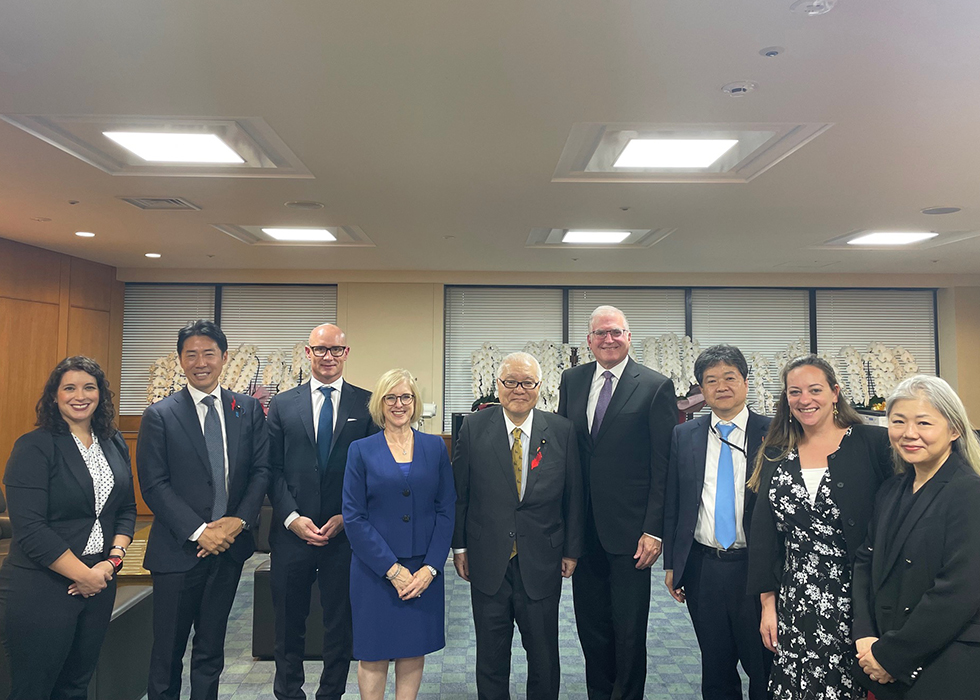Japanese government and business leaders discussed avenues to strengthen ties between the US and Japanese biotech innovation ecosystems in meetings with a delegation from the Biotechnology Innovation Organization (BIO) in Tokyo on Oct. 4-5.
“Japan can strengthen its innovation ecosystem and expand patient access by taking proactive steps to improve its drug pricing system to reward innovation and further developing the investment and tech transfer environment for emerging and established biopharmaceutical firms alike,” according to an executive summary of BIO’s white paper on Japan, presented during the trip.
 The delegation of executives from the BIO Board Standing Committee on International Affairs—the first since 2019—met Japanese lawmakers; the Minister of Health, Labor, and Welfare; the CEO of Japan’s regulator, the Pharmaceuticals and Medical Devices Agency; officials from the Ministry of Economy, Trade, and Industry; and Japanese industry representatives and associations.
The delegation of executives from the BIO Board Standing Committee on International Affairs—the first since 2019—met Japanese lawmakers; the Minister of Health, Labor, and Welfare; the CEO of Japan’s regulator, the Pharmaceuticals and Medical Devices Agency; officials from the Ministry of Economy, Trade, and Industry; and Japanese industry representatives and associations.
The latest trip followed BIO’s presentation to the influential “Chiukyo” advisory body to the Japanese Ministry of Health in September, where the association was invited to present results from its member survey exploring the attractiveness of the Japanese market for small and start-up biotech companies. This delegation visit gave an opportunity to further discuss ways in which changes to the policy regime can attract the biotech industry, particularly small firms, benefitting both innovators and Japanese patients.
“Our delegation sought to suggest realistic steps that Japanese officials could take to make the Japanese ecosystem a more welcoming place for small innovative biotech firms, as well as larger more-established companies,” said Nancy Travis, BIO’s VP of International Affairs who helped organize the trip. “Our hope is to expand the market, while increasing drug development and patient access to modern medicines in Japan.”
BIO’s recommendations
“A survey of BIO’s biotech and pharmaceutical member companies found that firms are interested in the market,” but they still see challenges to entry that officials can address, according to BIO’s white paper.
Member companies surveyed by BIO identified specific challenges, and BIO used these to formulate suggested improvements in the following areas:
- Reimbursement Policies: The group presented specific recommendations for encouraging innovation and easing market entry with targeted alterations to various aspects of the Japanese government’s pharmaceutical policies. The history of Japan’s biotech industry has been cited by United States observers as a warning for the potential negative effects of U.S. price control policy. Japan, which traditionally maintained drug price regulation balanced with government support, introduced more strict drug price controls in the 1980s, and the biotech industry suffered as a result, according to a report from Information Technology & Innovation Foundation (ITIF). The Japanese government, concerned about the lag in innovative medicines reaching Japanese patients, has acknowledged that “the existing pharmaceutical startup ecosystem is ‘not designed to secure necessary funds smoothly’ when compared with Europe and the United States, according to BIO’s white paper.
- Regulatory Process: “Removing the requirements for additional clinical trials would support foreign firms’ entry to the market,” said the white paper. There was discussion of saving time and cost by forgoing phase one clinical trials when these have already been conducted for another country’s regulators. BIO delegates also recommended establishing a greater number of expedited pathways for drug approval, and broadening the number of applications that can take advantage of these pathways.
- Life Sciences VC Market: Greater venture capital participation in the market is needed, and it can be encouraged by reducing some of the risks to investing in drug development.
- Tech Transfer and Industry-Academic Cooperation: “The lack of linkages between universities and industry have added to Japan’s biopharmaceutical innovation struggles,” according to the white paper. “Government support for university-industry partnerships through incentives and initiatives such as cross-sector engagement workshops would further enhance Japan’s drug discovery capabilities.”
Japanese officials react positively, but no timetable set
 “We were pleased to find an attentive audience, and genuine interest in our recommendations. There was a clear appreciation of the need to make Japan’s biotech ecosystem more receptive to new entries,” said Scott Koenig, President and CEO of MacroGenics, who led the delegation. “We believe these changes can bring about a win-win for the industry and Japan.”
“We were pleased to find an attentive audience, and genuine interest in our recommendations. There was a clear appreciation of the need to make Japan’s biotech ecosystem more receptive to new entries,” said Scott Koenig, President and CEO of MacroGenics, who led the delegation. “We believe these changes can bring about a win-win for the industry and Japan.”
While officials appeared to understand the need for the recommended improvements, they were not ready to set a timetable. Keizo Takemi, Minister of Health, Labor, and Welfare, explained to the delegation that the ministry is already undergoing a “triple revision” of medical fees, long-term care fees, and welfare service fees, so other policy changes have to wait.
Following this promising dialogue, the conversation is expected to continue. The Japanese government and industry officials who met with the delegation were all invited to the June 2024 BIO Convention in San Diego, and the head of Japan’s regulatory agency expressed strong interest in meeting with BIO’s Board of Directors. BIO will also send its white paper to each office once finalized.




